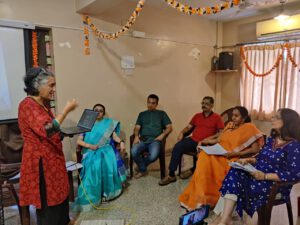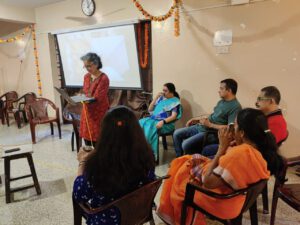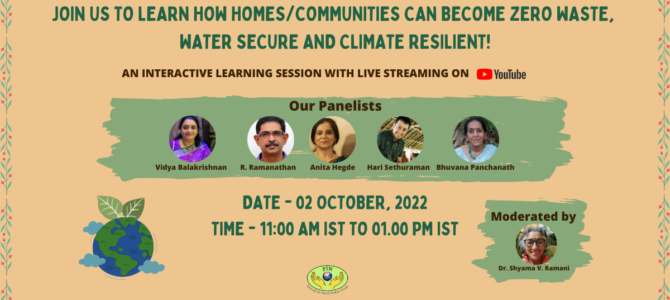India generates 62 million tonnes of waste each year. About 43 million tonnes (70%) are collected, of which about 12 million tonnes are treated, and 31 million tonnes are dumped at landfill sites. With changing consumption patterns and rapid economic growth, it is estimated that urban municipal solid waste generation will increase to 165 million tonnes in 2030 (source:https://en.wikipedia.org/wiki/Waste_management_in_India). If we keep generating waste at this rate, then the day you have to wear antipollution masks like astronauts during space visits – is not far! So, we need a fool proof plan to dispose of all kinds of waste to keep our communities and our planet earth a clean place to live for all future generations.

Under this context, to make people aware of this problem and their responsibility in both the problem and its solution – we did a hybrid event about: How to make your locality zero-waste, water secure, and climate resilient on October 2nd, 2022. This was held in Aashiana apartment, 2nd cross street, Venus colony, Alwarpet, Chennai – with the champions of the apartment complex who had achieved this. Our panelists were: Vidya Balakrishnan, R. Ramanathan, Anita Hegde, Hari Sethuraman, Hari Sethuraman, and Bhuvana Panchanath moderated by Shyama V. Ramani of FIN. They shared their story and the challenges they faced with achieving zero-waste, composting, grey water management, and many more. The event lasted two hours with active participation from the audience.
 The full recording will be available on our YouTube channel very soon, anyone can learn about waste management from there and implement it in their locality. So, look forward to your adventures in your house and apartment to reduce waste with the creation of useful products.
The full recording will be available on our YouTube channel very soon, anyone can learn about waste management from there and implement it in their locality. So, look forward to your adventures in your house and apartment to reduce waste with the creation of useful products.Background Context of Aashiana is a 175-apartment complex in Alwarpet, Chennai:-
Aashiana Apartments at Venus Colony in Alwarpet is a gated community in Chennai that has become renowned for successfully adopting best practices in waste management and water conservation. It makes an excellent case study for emulation and replication in other parts of Chennai and India.
What has it done?
• It has successfully implemented the source segregation of solid waste.
o Waste from the kitchen is segregated from the household garbage and is put in compost pits. The biodegradable waste is transformed on-site and then used as manure.
• It has successfully implemented good water management & liquid waste management
o Installation of Water Meters in Kitchen and bathroom inlet lines
o Residents pay for what they use.
o Users get to know individual consumption and have brought down consumption by changing habits.
o From 2010 to 2017, the Aashiana apartment recycled 1600 liters per day
o From 2018 to 2019, Aashiana apartment stepped up to 6720 liters per day by collecting bathwater from more blocks.
o Every month they save 180,000 liters with an investment of just Rs 30,000/-
• Water Security
o Aashiana apartments have 11 bore-wells, each measuring 200 ft in depth.
o An in-house Reverse Osmosis or RO plant provides drinking water to all residents @ 35 liters per flat per day.
o There are posters about saving 1/2 a bucket of water every day.
o Door to Door campaigns to save water.
o Grey water from the bathroom is filtered and goes to the garden. RO water discharge and treated water from STP goes to Cistern for flushing.
o The association also takes simple conscious efforts to save resources, such as switching to LED streetlights, energy-efficient water pumps, and rainwater harvesting systems.
o Aerators-As part of water conservation, in early 2017, they installed Aerators in 80% of the flats in Aashiana.
o These were fitted mostly in the kitchen as also in shower and wash basins in some of the flats.
o An Aerator helps in bringing down the usage of water from 15 LPM (Litres per minute) to 5 LPM.
o A robust rainwater harvesting system has been in place for 25 years
o They have 6 recharge pits.
o Aashiana apartments have become self-sufficient in meeting their water needs by getting water from their borewells which are replenished by their Rain Water Harvesting system.
o Aashiana apartment households barely bought water even during the peak water crisis
• Climate Resilience
o Since 2007, greywater from the kitchen in four blocks was collected and redirected to water the plants in the community garden. Gravel, sand, and charcoal are used to filter the water.
o The Drip Irrigation system started in 2008 to water plants using recycled water.
• Community engagement for sustainability behavior.
o Residents have replaced painted idols with soft mud idols for Ganesh Chathurthi.
• Evolution
o Phase 1: In 2007 a few residents of the community kick-started a source segregation project in two blocks.
o Phase 2: By, the exercise was implemented at the other nine blocks of the 175-unit facility given the success of phase 1.
RECOGNITIONS WON FOR ACHIEVEMENTS
• This gated community in Alwarpet, Chennai has received the Swachh Bharat Mission award from Greater Chennai Corporation, for its solid waste management initiatives.
• 2021- AASHIANA APARTMENTS received the best performance and superior dedication to the Swachh Survekshan 2021 throughout the year.
• 2018 – AASHIANA APARTMENTS received the ‘Best performance and superior dedication on the Swachh Survekshan throughout the year’.
• Aashiana apartment is arguably one of the first gated communities in Chennai to turn its premises into a green zone.
Aashiana Apartments in the Press and on the internet:-
1. Article Published by: The Hindu
2. Article Published by: The Hindu
3. Article Published by: The Times of India
4. Article Published by: Clean India Journal


